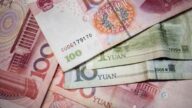【新唐人2014年10月20日訊】隨著中國經濟不斷下滑,中國股市也持續低迷。過去7年間,中國大盤持續下滑,中國股民已經虧損超過17萬億人民幣。而在上市公司的高管中,繼數千名高管陸續辭職後,日前又爆出在職高管減持股票,套現數百億元的驚人舉動。專家指出,中國股市的這種現象,反映了中國經濟的死結,以及中國上市公司不可告人的黑洞。
陸媒《四川在線》報導,10月16號,上證指數相對7年前同一天跌去了61%。07年的10月16號,上證綜指攀上6124點的歷史高峰。進入2008年,上證指數節節敗退,短短1年後的1月28號,最低跌到1664點,纍計跌幅超過72%。往後一直在2000點附近徘徊。
數據顯示,07年10月16號,中國股市共有1471只股票,總市值超過35萬億元﹔而今年的同一天,在A股市場上市交易的個股已經達到2558只,總市值卻只有29萬億元,當年的1471只股票的市值只剩18.52萬億元,7年時間,這些股票蒸發掉17萬多億元人民幣,這其中還沒有扣除通貨膨脹因素。
而在國際市場,不論是香港、歐洲、還是美國股市,早已恢復到金融海嘯以前的水平。美股2009年3月起連續上漲,去年連續創下新高,截至今年9月底纍計漲幅超過160%。而中國上證指數卻還是在2000點徘徊。
中國金融智庫研究員鞏勝利:「2000點可能就是中國股市的祭點,就是歷史沒有辦法繞過的這個點,除了經濟、市場的環境外,政治的黨的環境,這是難以繞過的死結。」
而《21世紀經濟報導》統計數據顯示,今年1月到9月份,上市公司高管在不斷減少對自家公司股票的持有量,其中,9月份創下年內新高,高管減少持股超過162億元。到10月中旬,被上市公司高管減少持股的公司共有769家,淨增減持金額超過474億元。
鞏勝利:「上市半個月或一個月之內都是套現走人,這是中國股市的一種潮流,這種情況往往是股市有水分,或者有黑洞,造成的一種結果,還有一種情況,是因為中國股市十幾年來一直不景氣,所以套現成了上市公司最基本的上市所要達到的目標。」
江浙某券商首席策略分析師,接受《21世紀經濟報導》記者採訪時表示,7月大盤指數反彈以來,一波小市值股票的漲幅比較明顯,瘋狂的上漲之後高管在9月份的套現可以理解。
美國南卡羅萊納大學艾肯商學院教授謝田:「他如果要減持的話,他會放一些利好的消息,讓他的股票有所上升,這樣他們拋售的時候才會多賺一點,實際上這些中國股民老百姓都被套進去了,減持突然增加,是從高管這個群體對中國經濟前景投了一個不信任票。」
另外,根據金融數據和分析工具服務商Wind的數據統計,截至9月15號,9個月中,大約出現了2000份上市公司的高管辭職公告,而離職的高管數量更是遠遠超過了公告份數。
其中,有110家公司的112位董事長先後離職,也就是說,平均不到3天時間就有1位上市公司董事長辭職。有些上市公司出現9個月內兩任董事長先後辭職現象。
謝田:「可能跟中共的反腐有關,國企高管,上市公司高管腐敗案例非常多,在這種重新歸隊,重新找靠山的時候,這種大規模的辭職可以理解。」
鞏勝利:「股市是中國來錢最快的行業了,高管套現走人,說明中國股市前景依然不好,而中國股市不好來源於中國經濟GDP的增長,9月份中國出了通縮的苗頭,這是一個嚴重的信號。」
通縮是通貨緊縮的簡稱,屬於一種金融危機。通貨緊縮,會造成企業利潤減少﹔個人預期收入降低﹔宏觀經濟悲觀衰退﹔金融秩序混亂等現象,對全球經濟造成的損害遠遠大於通貨膨脹。
採訪編輯/劉惠 後製/肖顏
Chinese Stock Market Sees Black Holes
Along with economic decline, the Chinese stock market
has also gone downhill.
Over the past seven years, Chinese investors have lost
an equivalent of 2.8-trillion US dollars (17-trillion yuan).
Following the resignation of several thousand executives
from listed companies, many of the serving executives
are said to be reducing their stock holdings, and cashing out
hundreds-of-billions of RMB.
Experts say the state reflects a deadlock in China’s economy
and a sinister black hole in the country’s listed companies.
The Chinese scol.com reported that the Shanghai Composite
Index (SCI) slid by 61% compared to seven years ago.
Oct.16, 2007—The SCI was on a historic peak of 6124 points,
but started to decline in 2008, and dropped to 1664 on Jan. 28,
2009, with a cumulative drop of more than 72%
and has since remained hovering at around 2000 points.
Data shows a total of 1,471 shares, with the total market
capitol reaching over 5.7–trillion dollars (35-trillion yuan)
in the Chinese stock market on Oct. 16, 2007.
However, 7 years later in 2014, the total worth was just over
three-trillion dollars (18.5-trillion yuan); nearly three-trillion
(17 trillion yuan) had evaporated over the 7 year period
(inflation not adjusted in calculation).
In international markets such as Hong Kong, Europe or U.S.,
stock markets have recovered from the financial tidal wave.
The U.S. stocks have gone up since March 2009, hitting new
highs last year; with a rise of over 160% by this September.
Chinese financial think-tank and researcher, Gong Shengli:
“China’s 2000 points is probably the point of offering for
China’s stock market; it can’t pass this level; it’s a deadlock
for the economy, stock market, politics and the Party."
Data from the 21st Century Business Herald showed China’s
listed companies suffering from their executives reducing
their stock holdings of their own companies
between January and September this year.
In September, the drop hit a record high of 2.6-billion dollars
(16.2-billion yuan), and by mid-October, a total of 769 listed
companies found its executives dropping their stock holdings
with a net monetary drop of 7.7-billion dollars (47-bn yuan).
Gong Shengli: “This is a trend in China’s stock market,
where the listing companies would cash out and leave
between two weeks and a month; it happens frequently
with the problematic or ‘black hole’ stocks."
“And because China’s stock markets have stayed sluggish
for more than a decade, companies see the cashing out
as their goal to becoming listed."
An anonymous chief strategist of a stock broker told
the 21st Century Business Herald that since the market index
rebounded in July, a wave of small-cap stocks rose obviously,
causing executives to understandably cash out in September.
Prof. XieTian, Aiken School of Business, Univ. of S.Carolina:
“To reduce the holding, they release some good news to raise
the stock value; then they can earn more when cashing out."
“In fact, other Chinese investors would become the victims;
a sudden increase in the reduction of personal holdings shows
a lack of trust in the economy by those investing executives."
According to Wind Financial Terminal, as of Sept. 15,
there have been about 2,000 resignations by top executives
from listed companies over the last nine months; yet the true
total of resignations is much higher than what is announced.
Among them are 112 chairmen from 110 companies, meaning
an average of one chairman leaving in less than every 3 days.
Some listed companies suffered from two chairmen
resigning within nine months.
Professor Xie Tian: “It could be related to the CCP’s anti-graft
campaign, as there are so many corrupt cases involving
the executives of listed companies."
“This kind of mass resignations and to look for new patrons
is understandable."
Gong Shengli: “The stock market is fast-money in China;
the executives cashing out and leaving indicates that
the outlook of the stock market is still bad."
“The bad stock comes from the GDP growth; China showed
signs of deflation in September and this is a serious signal."
Deflation is a financial crisis as it will cause corporate profits
to drop, lower expected individual income, cause pessimistic
macroeconomic recession and financial disorder, etc.;
the global economic damage is far greater than just inflation.
Interview & Edit/LiuHui Post-Production/XiaoYan






























